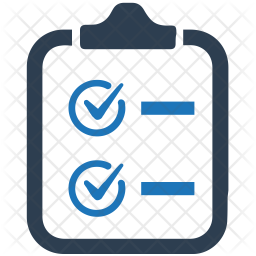 Department of EEE
Department of EEE
ELECTRICAL & ELCTRONICS ENGINEERING
INTRODUCTION
Three year full time diploma programme on Electrical and Electronics Engineering was started in the year 2009 with an intake of 60 students.
The students are admitted based on the 10th standard qualification and communal roaster followed in the state of Tamil Nadu. During the second year, the department admits 20% lateral entry students with Higher Secondary (Academic & Vocational) and ITI qualifications
The faculty members are qualified, highly committed, self-motivated and well trained to disseminate the best teaching-learning process to the students catering to the needs of industries.
We offer Industry based Electives on AutoCAD, PLC Programming, Home appliances and servicing, Solar installation, Two wheeler mechanism, Helper Electrician, Welding technician, fire and safety in collaboration with industry partners, Renault Nizzan pvt.ltd, Chennai, Kumaran Filaments Pvt.Ltd, Eureka Forbes Pvt.Ltd, Zoho Pvt.Ltd, Avalon Technologies Pvt.Ltd, Neel metal products Ltd, Crafts man automation, Ashok Leyland, Syrma, Lucas TVS Ltd, TI India, 5K Networks, Royal Enfield, TMTL, Anand Electronics and industries Ltd, TVS, URC Building values, Rebar design and detail, Brakes India Pvt.Ltd, Larsen and Toubro and TVS Sundaran clayton limited respectively.
We regularly conduct Continuing Education Programmes on Electrical AutoCAD, Arduino Programming, PLC and Sensor Technology, Electrical simulation, Electro Pneumatics, Solar Photovoltaic Technology, Helper electrician and Welding technician level - III under Canada India Institutional Cooperation Project CIICP and Tamilnadu Skill development corporation - TNSDC for diploma pursuing and undergraduate engineering students to make them employable.
VISION
Thevanesam Erudhaya Ammal Educational Trust is a non profit body whose mission is to provide qualitative Diploma education with values. The main focus of the trust is to create quality, standard, discipline, affordable education, health and inculcating leadership qualities along with technological advancements.
MISSION
Thevanesam Erudhaya Ammal Educational Trust will be recognized as an internationally renowned organization for promoting quality education through health and environment care.
PROGRAMME EDUCATIONAL OBJECTIVES (PEOS)
- The technocrats will have strong knowledge in the fundamentals of Electrical and Electronics Engineering and will have enhanced employability skills.
- The students will become eminent engineer by pursuing higher studies.
- The technocrats will become entrepreneurs and solution providers to cater to the needs of industries.
- The technocrats will have good Professional background with ethical values and engage themselves in lifelong learning.
PROGRAMME OUTCOMES (POS)
PO1. Basic knowledge:An ability to apply knowledge of basic mathematics, science and engineering to solve the engineering problems.
PO2. Discipline knowledge: An ability to apply discipline - specific knowledge to solve core and/or applied engineering problems.
PO3. Experiments and practice: An ability to plan and perform experiments and practices and to use the results to solve engineering problems.
PO4. Engineering Tools: Apply appropriate technologies and tools with an understanding of the limitations.
PO5. The engineer and society: Demonstrate knowledge to assess societal, health, safety, legal and cultural issues and the consequent responsibilities relevant to engineering practice.
PROGRAMME SPECIFIC OUTCOMES (PSOS)
PSO1. Able to manage and solve Electrical and Electronics Engineering problems in core industries.
PSO2. Able to provide technical solution to the Automation related industries by appropriate engineering hardware and software tools.
HOD DESK
The Department of Electrical and Electronics Engineering is committed to create talented Electrical Technocrats for the challenging and continuously changing industrial scenario.
The EEE department provides the students with in-depth knowledge on basic principles of Electrical Technology, Electrical Circuits, Electronic Devices and Circuits, Electrical Measurement and Instruments, Power Generation, PLC and Microcontroller, Digital Electronics etc., and ample opportunities to choose their field of interest and shine in their career.
ELECTRICAL ENGINEERING LAB I
This Laboratory is used to impart the knowledge of DC and AC Machines to the students. “The-art facilities in the laboratory are very useful to conduct experiments to supplement the theoretical knowledge gained by the students during the classroom teaching. Further, the worksheets given to the students during the practical session make them understand the industry relevance of the experiments.
Major Equipment's
- DC Series motor
- DC shunt motor
- DC Compound motor
- DC Generator
- Single phase AC motor
- Three phase Squirrel cage induction motor
- Three Phase Induction motor
- Three phase loads
- Single phase loads
- Single phase transformer
- Three phase transformer
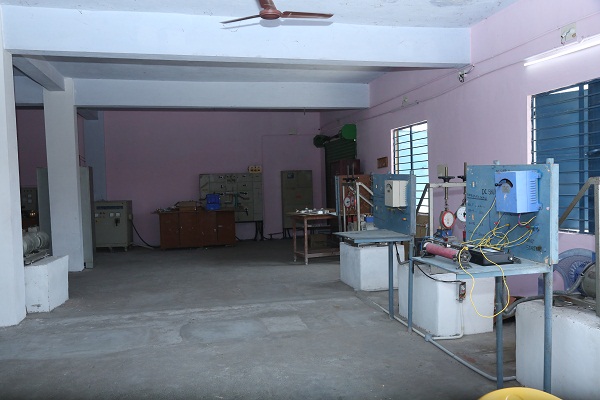
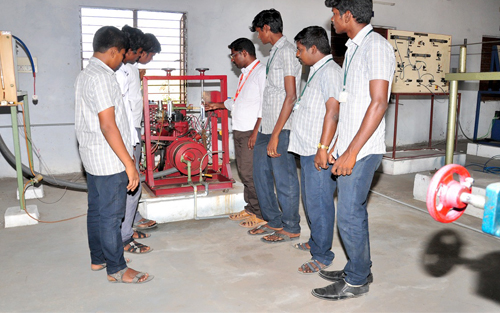
Electrical Engineering Lab II
This laboratory helps the students to construct various motor control circuits using industrial standard Electro-magnetic contactors and push buttons. Each work bench is equipped with a MCB controlled three-phase AC supply and single phase AC supply to conduct various experiments taking into consideration of safety aspects. This laboratory also helps the final year students to gain knowledge on control panel wiring. The facilities available in the laboratory help the students to understand the operation of Control of electrical machines.
- Desktop Computers and LCD Projectors
- Bimetallic thermal over load relay kit
- Automatic rotor resistance starter kit
- Automatic star- delta starter kit
- Semi automatic star – delta starter kit
- Direct online starter kit
- Dynamic breaking of DC generator kit
- Autotransformer starter kit
- High and Low speed control kit
- Forward and reverse operation kit
- Phase failure kit
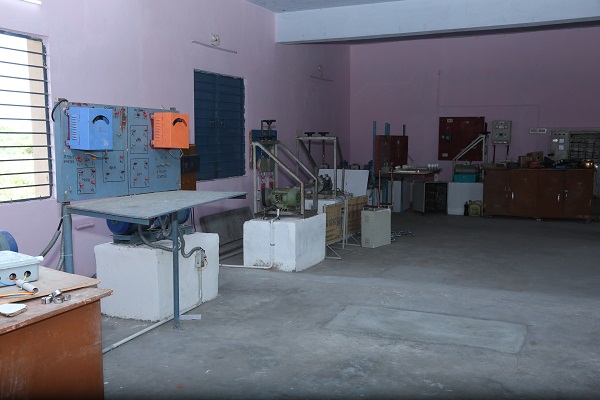
ELECTRONICS LAB I
This Laboratory helps the students to understand the characteristics and applications of basic electronic devices. Each work table is equipped with DC and AC Power Supply Unit fabricated by our supporting staff. The latest addition of National Instruments (NI) ELVIS II Electronics board with NI Instrument Launcher software facilitates the students to learn and understand the virtualization of Analog and Digital Electronics Circuits.
Major Equipment's
- Function generators
- CROs and DSO
- Transistor configuration trainer kit
- AC Measuring kits
- DC measuring kits
- Rectifier, Oscillator and amplifier trainer kits
- Desktop systems with simulation development
- LVD kit
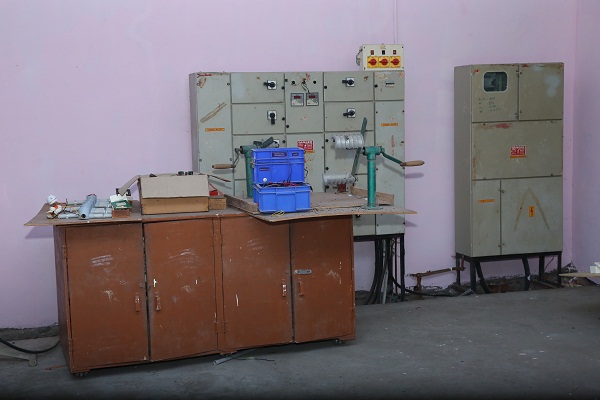
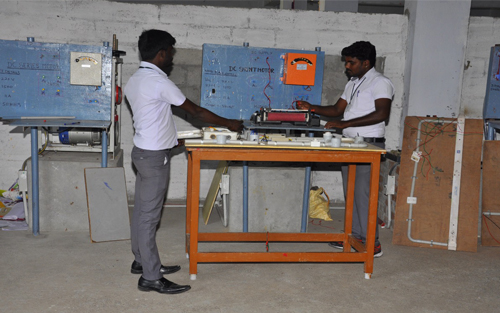
WIRING AND WINDING LAB I
This laboratory helps the students to understand the various electrical windings, types of electrical wiring, frequently used electrical equipments servicing, and safety precautions to be made during electrical work
- Winding equipments
- Wiring tools
- Safety kit ( Gloves, shoes, dress etc.,)
- Microwave oven training kit
- Ion box training kit
- Induction stove training kit
- Mixer grinder training kit
- Solar panel
- On load and off load UPS
- Inverter trainer kit
- Electric fan trainer kit
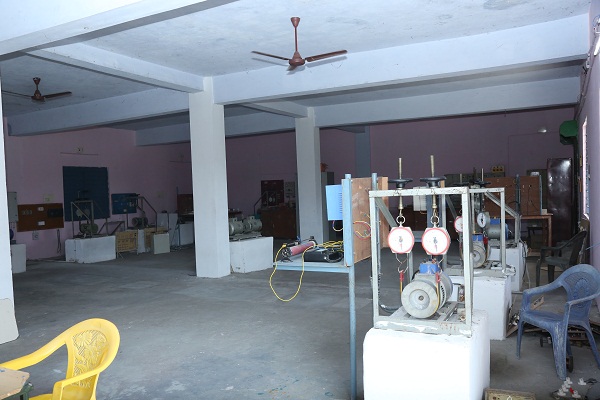
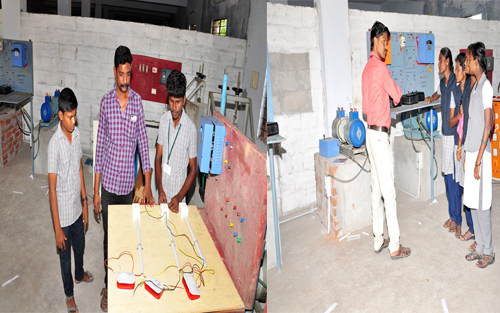
EDUCATIONAL TOUR
There has been a paradigm shift in the teaching methods used by the present day trainers. The mostly used and abused method of training namely the ‘Lecture Method’ is not the only method used now days by the trainers. There are more than 100 methods of training available to trainers. The choice of method adopted depends upon the objectives, the entry behavior, the resources available and the entry behavior of the trainee and so on. However, one of the methods available is known as ‘Educational Tour or a Field Trip’




